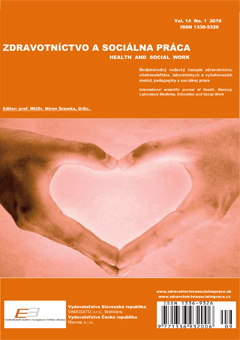FEKÁLNA MIKROBIÁLNA TRANSPLANTÁCIA AKO „NOVÁ“ FORMA MODULÁCIE ČREVNÉHO MIKROBIÓMU
FECAL MICROBIAL TRANSPLANTATION AS A „NEW“ FORM OF INTESTINAL MICROBIOME MODULATION
Author(s): Peter Juriš, Martin UrdaSubject(s): Health and medicine and law
Published by: SAMOSATO, s. r. o., Bratislava, Slovensko - MAUREA, s. r. o., Plzeň, Česká republika
Keywords: fecal microbial transplantation; enterocolitis; coprophagy; microbiome; stool banks;
Summary/Abstract: Introduction: Knowledge about microbial constitution of gastrointestinal tract is still being expanded, showing that its changes can influence whole organism. Microbiome contribution in pathogenesis of various diseases is being proven too. Moreover, many cases of coprophagy and consumption of other non-nutritive substances are appearing in psychiatric practice and institutionalized care. That, along with discovery of gut-to-brain axis, suggests influence of microbiome on our mental status. Core: Fecal microbial therapy (FMT) is currently shown in role of positive microbiome modulator. First historical uses of this method had shown, that it helped in alleviating gastrointestinal symptoms even in those times. Methods and processing, storing and application techniques of FMT are relatively easy, but there is still lack of standardization. That concerns donors and recipients too. In the present, its primary indication is recurrent Clostridium difficile enterocolitis, but implications of its future use are much wider. Conclusion: In the past, microorganisms were thought of as dangerous pathogens. Our current opinion has changed and microorganisms are considered to be crucial comensals in hosts health. Thanks to this, the next research and use of this therapeutical method in clinical practice is open and its further modifications and improvements will probably bring positive results.
Journal: International Journal of Health, New Technologies and Social Work
- Issue Year: 14/2019
- Issue No: 3
- Page Range: 116-125
- Page Count: 10
- Language: Slovak

